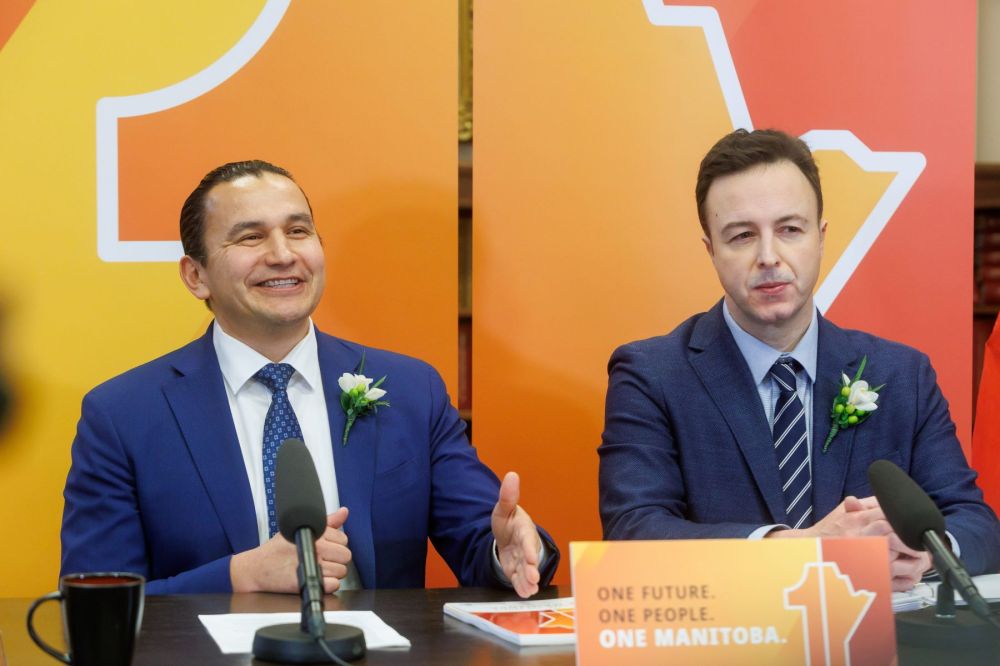
The NDP government made good on an election promise Tuesday, as millions of dollars in rebates for new and used electric vehicles and plug-in hybrids was announced as part of the provincial budget.
Premier Wab Kinew called the $5.4-million rebate, which will provide $4,000 for new vehicles and $2,500 for used cars, “a significant step towards electrifying transportation in Manitoba,” particularly for lower- and middle-income Manitobans.
No funding has been set aside for electric vehicle charging infrastructure, though Finance Minister Adrien Sala suggested those commitments would come in the future.
“Manitoba, it seems to me, is playing catch-up with other jurisdictions that have an (electric vehicle) rebate,” Molly McCracken, director of the Canadian Centre for Policy Alternatives’ Manitoba office, said after the budget announcement.
“A lot of people in the climate community have been concerned about too much emphasis on (electric vehicles) because that’s really just swapping out gas cars for electric vehicles, when we know we actually have to also get people on transit.”

McCracken said many climate-policy analysts were hoping to see the province recommit to a 50-50 cost-sharing program with municipalities for public transit infrastructure. That funding was cut by the Progressive Conservatives in 2017.
Asked about funding for public transit, Kinew touted a $10-million investment in Winnipeg-based electric bus manufacturer New Flyer Industries. The funds will be used to create 400 “low-carbon manufacturing jobs,” and help establish a national innovation centre for heavy equipment vehicles in Winnipeg.
“We want to make a showcase here so other jurisdictions can say: ‘That’s how you run a transit system, that’s how you bring zero-emission buses online,’” Kinew said. “That’s how I think we can really punch above our weight in terms of fighting the climate crisis.”
“We want to make a showcase here so other jurisdictions can say: ‘That’s how you run a transit system, that’s how you bring zero-emission buses online’”–Wab Kinew
The budget also promises to deliver on a campaign commitment to provide ground-source heat pumps to Manitoba families, but stops short of dedicating specific funds to the initiative.
McCracken said the CCPA had been pleased by the campaign commitment to geothermal heating, but was disappointed not to see specific numbers in the budget.
“We need to rapidly do energy-efficiency upgrades to our commercial and residential buildings (but) there’s really nothing in there about that,” she said. “There’s green talk but not a lot of numbers attached.”
The Manitoba government campaigned on a promise to connect 5,000 homes to geothermal heating over four years at a cost of about $32 million annually. That program will be delivered in partnership with the federal government.
“Going to ground source geothermal heat pumps to be able to electrify home heating is a really important priority for the homeowners themselves; it also frees up electricity on the grid,” Kinew said.
Asked how much money would be dedicated to the program, or how many homes the province hoped to connect this fiscal year, Sala said details were still forthcoming.
Beyond following through on campaign pledges, Manitoba’s climate and environment funding amounts to approximately $11.5 million in sweeping budget lines geared at funding “initiatives under Manitoba’s plan for climate and sustainability priorities,” including restoring an unspecified amount of funding to environmental organizations, and a $5-million contribution to the bilateral low-carbon economy agreement with the federal government.
Trudeau’s parliamentary secretary Terry Duguid praised Kinew for making strides on climate change that aligned with federal priorities.
“I appreciate the spirit that I’ve heard from the premier, which is very different than the spirit from other premiers across the country. Premier Kinew is, at least, prepared to work with us to find a way forward,” Duguid said.
Asked about the premier’s statements regarding the federal backstop carbon price, Duguid, who serves as member of Parliament for Winnipeg South, expressed hope the province would soon produce a made-in-Manitoba plan that is acceptable to the federal government and meets the standards that other provinces are meeting.
Much of Manitoba’s climate commitments will be paid out of the long-standing $40-million climate and green fund, which supports the development and implementation of various environmental innovation, carbon-reduction and climate-change projects.
While the budget promises to increase staffing for parks and the conservation officer service, it makes no mention of the NDP’s campaign promise to work towards protecting 30 per cent of lands and waters by 2030.

Julia-Simone Rutgers
Reporter
Julia-Simone Rutgers is a climate reporter with a focus on environmental issues in Manitoba. Her position is part of a three-year partnership between the Winnipeg Free Press and The Narwhal, funded by the Winnipeg Foundation.
Read full biography


